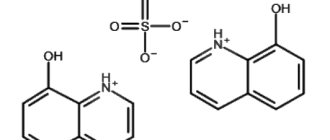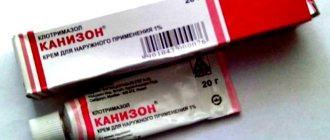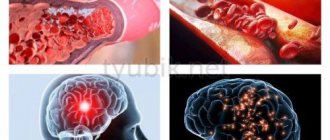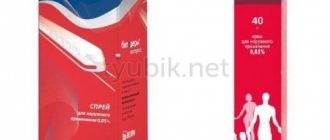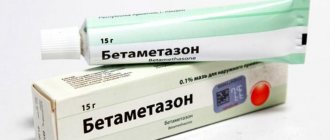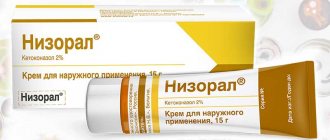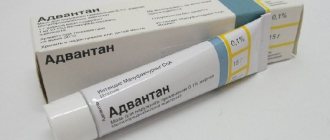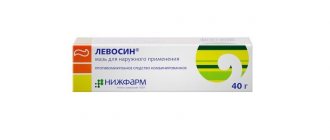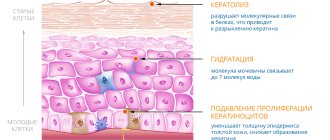The principle of action of the drug
How does the drug "Etonium" (ointment) work? The instructions state that this medication exhibits bacteriostatic and bactericidal properties. In other words, it has the ability to destroy all bacterial microorganisms and suppress their reproduction.
It should also be noted that the remedy in question accelerates the healing process of wounds and regenerates damaged tissue. In addition, it has a moderate anesthetic effect.
The drug “Etonium” (ointment) exhibits the highest therapeutic activity against harmful bacteria such as staphylococcus and streptococcus. In addition, this medication has a detoxifying effect on their waste products.
Pharmacological action Etonia
The therapeutic effect of using the drug Etonium is due to the presence of an ammonia derivative in its composition (the actual substance Etonium). The substance has bactericidal and bacteriostatic effects due to the detoxification of staphylococcal toxin and a number of other pathogenic microorganisms, as well as due to disruption of the synthesis process in their cells.
Etonium is able to stimulate wound healing, regenerate areas of damaged tissue, and have a mild anesthetic effect.
Indications for use
In what cases should Etonium ointment be used? The use of this local medicine is indicated for:
- itchy dermatosis;
- trophic skin ulcers;
- cracks in the perineum and rectum;
- radiation damage to the skin;
- gingivitis (that is, inflammation that develops on the mucous membrane of the gums);
- corneal ulcers;
- cracked nipples;
- burns of mucous membranes and skin;
- otitis (that is, with inflammation of the cavity of the auditory organ);
- tonsillitis (that is, with inflammation of the tonsils and tonsils);
- keratitis (that is, infectious inflammation of the cornea);
- stomatitis (that is, inflammation of the oral mucosa).
It should also be noted that this drug in the form of a paste is actively used in dental practice in the treatment of pulpitis and dental caries.
Etonium - instructions, price in pharmacies, analogues
The active ingredient in this disinfectant is aethonium (1,2-Ethylene-bis-N-dimethylcarbdecyloxymethyl ammonium dichloride). The paste contains peach oil and synthetic dentin as excipients.
Etonium is supplied as a powder for solution, paste or 0.5% and 1% ointment.
The paste is packaged in jars of 20 g, and the ointment is packaged in containers of 25 g.
The drug Etonium is available in several dosage forms:
- In powder form, crystalline, white in color, endowed with a specific odor, soluble in alcohol and water.
Active ingredient: aethonium.
- In the form of an ointment for external use.
Active ingredient: 5% aethonium.
Auxiliary components: anhydrous lanolin, medical vaseline, water.
In a cardboard pack - 1 can with 25 g, 20 g, 15 g.
Active ingredient: 7% aethonium.
Auxiliary components: peach oil, dentin.
Indications for use
Main indications of the drug Etonium:
- trophic purulent skin ulcers;
- cracked nipples;
- cracks of the perineum and rectum;
- itchy dermatoses;
- corneal ulcers;
- radiation damage to the skin;
- skin burns and mucous membranes;
- otitis;
- inflammation of the ear cavity;
- tonsillitis (inflammation of the tonsils and tonsils);
- gingivitis (inflammation of the gum mucosa);
- keratitis (ulcers and inflammation of the cornea);
- stomatitis (inflammation of the oral mucosa);
- pulpitis (use of paste);
- dental caries (use of toothpaste).
Paste:
- treatment of purulent and gangrenous forms of pulpitis.
Indications for prescribing Etonium as a primary or additional drug are:
- trophic ulcers (including festering);
- pyoderma (pustular skin lesions);
- dermatoses accompanied by itching of the skin;
- gingivitis (gum inflammation);
- periodontitis (inflammation of periodontal tissues);
- keratitis;
- ulcerative lesions of the cornea;
- cracked nipples;
- rectal fissures;
- otitis (inflammation of the middle ear);
- tonsillitis (inflammation of the tonsils)
- skin manifestations of radiation damage;
- burns (thermal and chemical);
- pulpitis and caries (paste is used for filling teeth).
A contraindication to the use of Etonium may be hypersensitivity (individual intolerance) to the main component or excipients. In dentistry, the paste is not used in the treatment of purulent and gangrenous pulpitis.
Directions for use and dosage
The drug Etonium is intended exclusively for external local use. Wounds and ulcerations of the skin and mucous membranes are treated with ointments and pastes (0.5-2%) and solutions (0.02-1%).
In ophthalmology, a 0.1% solution is used to treat the eyes. It should be instilled 1-2 drops 3 times a day. The duration of the course of treatment should not exceed 10 days.
For otitis and tonsillitis, 0.1% Etonium solution is used for irrigation and rinsing.
Therapy of oral diseases involves the use of a 0.5% solution for applications. The duration of each procedure should be from 15 to 20 minutes. The duration of the course of treatment is from 2 days to 1 week (depending on the severity and nature of the pathological process).
For skin lesions, use 0.5-2% ointment. The duration of treatment can range from 3 days to 1 month.
For pulpitis and caries, the paste is applied after removing infected enamel and dentin under a temporary dressing (filling). The procedures are repeated every other day.
There is no information about overdose.
Etonium is indicated externally for local use. The treatment regimen, dosage, duration, and release form of the drug are determined based on the type of disease.
The solution and ointment are indicated for treating mucous membranes and damaged areas of the skin. Etonium in the form of a solution is widely used for lotions, applications, and irrigation of the oral cavity. Local antiseptics are prepared from the powder, and the paste is used in dentistry for filling teeth.
The degree of damage to the skin or mucous membrane, indications affect the concentration of the finished drug:
- 0.02 - 1% solution or ointment 0.5 - 2% - for the treatment of mucous membranes, ulcerative skin lesions, for the treatment of wounds;
- 0.5 - 2% ointment - for the treatment of itchy dermatitis, burns - thermal, radiation, chemical, for trophic ulcers and purulent inflammation of the skin, duration of treatment - from 3 days to a month, depending on the severity of the lesion;
- 0.1% solution – for the treatment of purulent otitis and tonsillitis (spraying and washing);
- 0.5% solution - for stomatitis (applications are indicated, which should be held for 15-20 minutes, the required course of therapy is from 2 to 7 days);
- 0.1% solution - for keratitis, eye lesions, corneal ulcers (drop directly into the eyes three times a day, 1-2 drops, the general course of therapy is no more than 10 days).
pharmachologic effect
Etonium is endowed with bactericidal and bacteriostatic effects. The properties of the drug are to destroy bacterial organisms and actively suppress the process of their reproduction.
Etonium significantly accelerates the regeneration of damaged tissues and, thereby, wound healing, and has a weak anesthetic effect.
Etonium ointment inhibits the proliferation of pathogenic microflora (in particular streptococci and staphylococci) and promotes its destruction. A feature of the antiseptic drug is that it is able to neutralize the toxin produced by staphylococci.
Features of stastosuvannya
Do not allow the drug to get into your eyes.
Suspension during pregnancy or breastfeeding.
There are many reasons to remember that taking the drug during pregnancy poses a risk. In the future, the drug should be used according to the doctor’s instructions.
When used to heal cracked nipples during the breastfeeding period, the drug should be removed before bathing.
This is due to the fluidity of the reaction during treatment with vehicles or other mechanisms.
Doesn't flow in.
Zastosovuyut externally.
To treat trophic lesions and wounds, apply the drug directly to the wounded surface and apply a sterile bandage, or apply the ointment to the bandage, and then to the wound.
Apply the drug to mature skin areas 1-2 times per day. The duration of the treatment course is from 3 days to 1 month.
Evidence of Etonia's support for children every day.
Source: https://maziuki.ru/maz-etoniy/
The drug "Etonium" (ointment): instructions for use
How should the drug in question be used? According to the instructions, this drug in the form of an ointment should be used externally only.
The concentration of this medicine depends on the degree of damage to the mucous membrane or skin, as well as on the following indications:
- Trophic ulcers and purulent inflammations of the skin, as well as radiation, thermal and chemical burns. In addition, this remedy is used for itchy dermatitis (0.5-2% ointment is used). The duration of treatment with this drug depends on the severity of existing lesions (from 3 days to 1 month).
- For stomatitis, do not use Etonium ointment, but a 0.5% solution. It is used to make applications that are kept on the affected area for about 15–20 minutes. The duration of treatment with this remedy is 2-7 days.
- When treating ulcerative lesions of the mucous membranes and skin, as well as various wounds, 0.5–2% ointment is used.
Directions for use and dosage
Etonium is used externally only. The dosage and form of release of the drug depend on the type of disease in the patient. To treat ulcers and wounds, it is better to use Etonium in the form of a solution, which is made using powder, or use an ointment. When treating corneal ulcers, use a 0.1% solution, which is prepared on a powder basis. The solution is instilled into the eyes, 1-2 drops three times a day. The course of treatment is ten days. Tonsillitis and otitis are treated with a solution of the same concentration. At the same time, spraying or washing with Etonium is done.
Etonium ointment is used to treat trophic ulcers, burns of various etiologies, and itchy dermatitis. The ointment is applied to the affected part of the skin. Treatment can last two weeks, the minimum duration of procedures is three days.
Etonium paste is used in dentistry. It is used for filling teeth.
Contraindications of the drug and side effects
According to the attached instructions, Etonium ointment is contraindicated for use if the patient has a personal hypersensitivity to its ingredients.
As for this form of medicine, such as paste, it is not used in the treatment of purulent and gangrenous forms of pulpitis.
Side effects that may occur during the use of this product include itching and redness of the skin. If a patient has intolerance to etonium, then he may develop allergies of varying severity.
Composition, release form and packaging
The drug Etonium is available in several dosage forms:
- In powder form, crystalline, white in color, endowed with a specific odor, soluble in alcohol and water.
Active ingredient: aethonium.
- In the form of an ointment for external use.
Active ingredient: 5% aethonium.
Auxiliary components: anhydrous lanolin, medical vaseline, water.
In a cardboard pack - 1 can with 25 g, 20 g, 15 g.
- In the form of a paste.
Active ingredient: 7% aethonium.
Auxiliary components: peach oil, dentin.
- In the form of a solution.
The cost of the ointment and reviews about it
How much does Etonium ointment cost? The price of this local drug ranges from 50-95 rubles. You can buy it at any pharmacy.
According to user reviews, the medication in question is a very good bacteriostatic and bactericidal agent. Its use helps cure diseases such as itchy dermatosis, trophic skin ulcers, cracked nipples, various burns, otitis media, etc. Also, many patients are pleased with the safety of this drug (virtually no side effects) and its affordable price.
Compound
The main active ingredient of Etonium ointment is the pharmacological substance of the same name. In addition to the main component, the ointment contains a water base, lanolin and petroleum jelly, which give the preparation the necessary consistency. Auxiliary elements allow for gentle application of the ointment to irritated and sensitive skin.
Etonium is an ammonia derivative that has a large range of positive properties. The main effect of the drug is due to this active substance.
Etonium, which is part of the ointment, provides the following therapeutic effects:
- It has an antibacterial effect, preventing the growth of bacteria and destroying the source of infection.
- It has an active antiseptic effect, helping to disinfect and cleanse the affected skin.
- Actively neutralizes various types of bacteria and other microorganisms.
- Anesthetizes the treated area of skin, relieves discomfort, burning and itching.
- Activates skin regeneration, stimulating the healing of damaged tissue.
- Restores the structure and functionality of the skin.
What is the price? The price of Etonium ointment is 60 rubles. On sale you can find the drug in tubes and glass jars.
